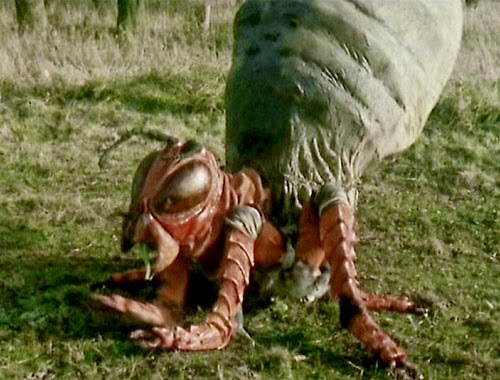I have already reviewed Harvest of Kairos back in 2010, but this time I want to talk more about the conflicting ideas in it that make it so bad, because it does have a couple of good ideas in there buried under Jarvik and the giant ant.
Let's start with Jarvik; his first line of dialogue and his first action:
"Woman, you're beautiful."
Ben Steed starts as he means to go on in his first of three sexist scripts for the series. Jarvik is a MAN. He seduces Servalan by being the manliest
Here's some more dialogue from Jarvik to Servalan:
"But when was the last time you felt the warmth of the Earth's sun on your naked back? Or lifted your face to the heavens, and laughed with the joy of being alive? How long since you wept at the death of a friend? Doesn't mean a thing to you, does it, Madam President? You've surrounded yourself with machines and weapons, mindless men and heartless mutoids, and when they've done your work, and the machines have done your thinking, what is there left in you that feels?"
Jarvik is so camp it becomes funny instead of offensive, and his scenes end up as immensely enjoyable for it.
Also he is very manly too.
One of the main reasons I could never consider this episode as truly good is because the regular characters all have to act stupid in order to make Jarvik seem clever. Avon rescues the others from one set of Federation guards that capture them, but the second set are not cleverly hidden at all and would have been discovered instantly if they had looked inside the big boxes before stealing them.
Avon gets a couple of clever moments, but on the whole Paul Darrow does not look like he thought much of the script and seems to play most of his scenes and Avon's lines with a contemptuous, bored expression - even when captured by Servalan.
Maybe he is just jealous that she got to kiff Jarvik instead of him?
Down on the planet Kairos we see the giant ant monster, filmed out in the open in broad daylight because the director wanted to show off how impressive and scary it is.
Whenever I see mannys watch this episode they always laugh at the monster. Cthulhu insists that it is nervous laughter, and he says that they have probably just lost some points of Sanity.
Fortunately for Dayna, Jarvik turns up to save her from the monster. This scene has the nice touch of Tarrant outing Jarvik as a baddy by noticing he has a teleport bracelet so he must have come from the captured Liberator.
On the subject of good points, as Shallow pointed out in the comments of my last review the mystery of why Kairos is so dangerous is quite well done, paying off with the monster as it does, but it is not enough to save the episode from being a stupid, sexist mess of manliness and stupidity.
There is one scene that almost redeems the story, though. It comes near the end of the episode when Avon, Tarrant, Vila and Cally are on the old spaceship that they found on Kairos and are flying it towards the Liberator.
Avon gives their spaceship the properties of the Sopron, clumsily foreshadowed throughout the episode like Chekhov's Rock.
This is the one scene of the whole episode where Avon looks like he is enjoying himself. Maybe because he is saving the day again? Or maybe because he knows it is nearly over.
Tarrant bluffs Servalan and Jarvik that their spaceship is more powerful than the Liberator so they should surrender.
Jarvik laughs at this audacious bluff that he sees through because he is a MAN, but Servalan is fooled because Zen backs Tarrant up, and because she is not a MAN she believes the computer instead of Jarvik.
I like the way this scene works because Avon, Tarrant and Servalan (and even Zen) are all behaving in character - for a change - and so the way Servalan is defeated has an authenticity to it.
Jarvik is too manly to be in any other episodes of Blakes 7, so his friend Captain Shad shoots him instead of Dayna. That is why Jarvik-7 is the name of an artificial heart, not the name of an exceptionally manly spin-off series.
Avon thinks Jarvik was a "Federation thug" but Tarrant describes him as a "special sort of MAN."
Poor Jarvik, all he wanted to do was be a manly MAN.
Harvest of Kairos is a very entertaining episode, with so many ideas - good and bad - crashing into each other it is never boring. In a way its greatest crime is not having enough of Avon in it, although the character of Jarvik is almost manly enough to make up for that.
If it had been Ben Steed's only episode then I think the sexist angle would be less problematic and more comic (because here it - like all of Jarvik's MAN traits - is so over the top as to become laughable), but when you consider this along with Moloch and Power... well, I will discuss those episodes in due course.






















































